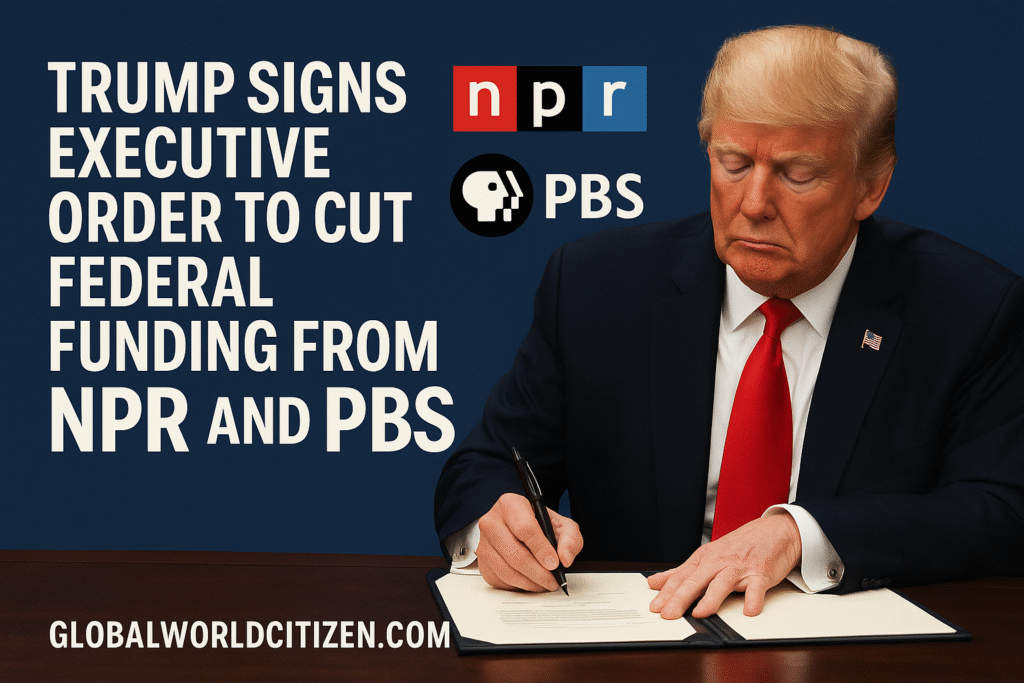Published Date: May 2, 2025 ✍️ Author: Global Media & Democracy Desk 🌐 Source: GlobalWorldCitizen.com
In a decision poised to reshape the future of American public broadcasting, President Donald Trump has signed a controversial executive order eliminating federal funding for both National Public Radio (NPR) and the Public Broadcasting Service (PBS).
The move, justified by the administration as a response to “biased and woke reporting,” has ignited a nationwide debate over press freedom, independent journalism, and the future of public media in the United States.
 What the Executive Order Says
What the Executive Order Says
The order, released Wednesday, directs the Corporation for Public Broadcasting (CPB) to:
Immediately halt direct federal funding to NPR and PBS
Terminate all indirect support, including restrictions on public stations funneling federal dollars into NPR or PBS-produced content
The administration claims that in today’s digital era, government-funded news is no longer necessary:
“Taxpayers should not be forced to subsidize radical, woke propaganda disguised as news,” a Trump spokesperson posted on X.
 How Much Federal Funding Do NPR and PBS Receive?
How Much Federal Funding Do NPR and PBS Receive?
While NPR and PBS have yet to issue formal responses, both organizations have historically emphasized the critical role of federal support, particularly in underserved communities.
PBS: Receives approximately 15% of its total budget from federal funds, equating to $1.60 per U.S. taxpayer per year
Funding primarily supports local PBS affiliates, especially those in rural and low-income areas
NPR: Relies on a mix of public grants, private donations, and station fees, with federal dollars playing a vital role in sustainability
Unlike countries with fully state-supported media, the U.S. model blends public-private funding — a hybrid now facing existential risk.
 Public Trust in NPR and PBS Remains High
Public Trust in NPR and PBS Remains High
Despite partisan attacks, both NPR and PBS consistently rank as two of the most trusted media outlets in the United States.
Over 60% of Americans — including more than half of Republicans — trust public broadcasting for factual reporting
“Three-quarters of Americans believe PBS provides excellent value,” noted PBS CEO Paula Kerger
“Public broadcasting is one of the most effective civic investments our nation makes,” added NPR CEO Katherine Maher
 GlobalWorldCitizen.com Insight: Defunding Public Media Is a Global Red Flag
GlobalWorldCitizen.com Insight: Defunding Public Media Is a Global Red Flag
The cutting of federal funds to NPR and PBS is more than a national issue — it’s a global signal about the future of media independence, information access, and democratic transparency.
Key Concerns for Global Citizens:
Local journalism at risk: Rural and underserved communities may lose access to non-commercial, educational news
Media pluralism weakened: Less public funding may lead to greater media concentration in partisan, for-profit outlets
Political retaliation or reform?: Is public broadcasting being punished for its editorial independence?
 Final Word from GlobalWorldCitizen.com
Final Word from GlobalWorldCitizen.com
President Trump’s order to strip federal funding from NPR and PBS reflects a profound policy shift in America’s relationship with its public media institutions. This decision raises urgent questions not only about media bias—but about the future of non-partisan journalism, community storytelling, and press freedom in democracies worldwide.
As digital ecosystems grow more fragmented and commercialized, independent public broadcasting remains one of the last safeguards for truth, education, and civic unity.
Independent media is not a luxury—it’s a cornerstone of free and informed society.

Press freedom and censorship trends
Public media funding models
U.S. democracy and global policy shifts
Cultural diplomacy through independent media
At GlobalWorldCitizen.com, we protect the global flow of facts. Because democracy depends on it.

